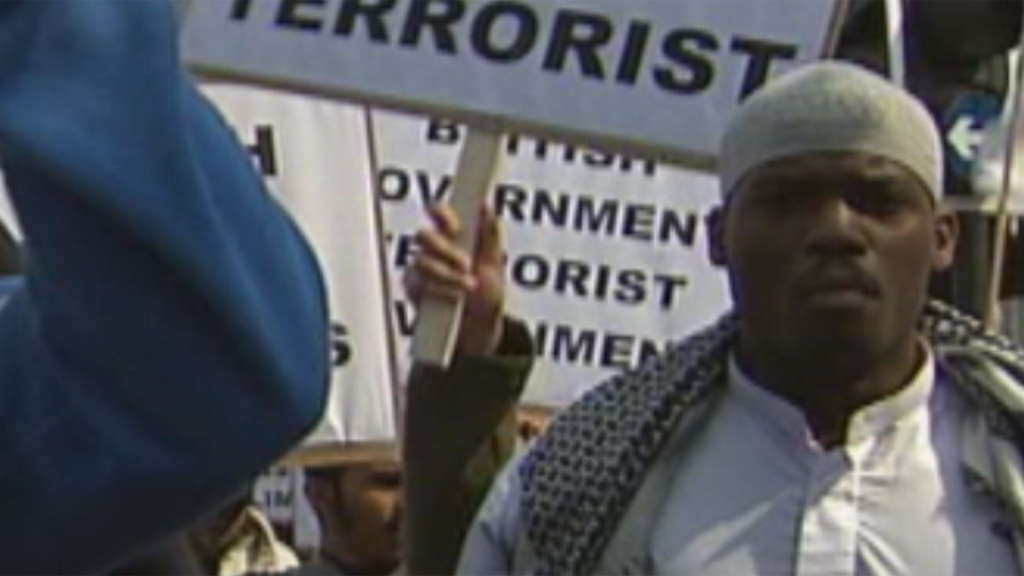Woolwich attack: suspect known to banned Islamic group
The former leader of the banned Islamic group Al Muhajiroun says he knew one of the suspects, believed to be Michael Adebolajo, as security forces admit that both were on their radar.
The two men behind the fatal knife attack in Woolwich have not been named officially. But details are quickly emerging by those who say they recognised the men from the photos and video footage taken during, and just after, the attack.
Anjem Choudary, the former leader of banned Islamic group Al Muhajiroun, said he knew one of the alleged attackers from meetings and lectures, and that he went by the name of Mujahid.
As far as I’m aware he was a normal, practising Muslim, concerned about the Muslim affairs worldwide Anjem Choudary
He recognised the suspect filmed with bloodied hands, wielding a cleaver after the attack, but said he had not seen him for two years.
The same man has been named by some sources as Michael Adebolajo, a British-born Nigerian.
Both men appear to be in their 20s or early 30s, and are both black.
The prime minister said there would be an investigation into whether suspects were known to security forces. One security source told Channel 4 News that they were featured in a number of investigations over the past eight years.
#woolwich security source tells me the two featured in a number of investigations in the past 8 years
— simon israel (@simonisrael) May 23, 2013
Former Neighbour of one of alleged Woolwich killers just told me she’d thought he was doing normal teenage rebellion.
— Katie Razzall (@katierazz) May 23, 2013
Michael Adebajo was a “normal kid” she said. The family left Romford a few years ago. “I feel so sorry for his parents, they are so nice”.
— Katie Razzall (@katierazz) May 23, 2013
‘Calm, non-violent man’
Mr Choudary said that the man he knew as Mujahid had converted to Islam in 2003.
“I can see from the clip yesterday that one of them is brother Mujahid. He’s a revert to Islam… He used to attend a few years ago some of the activities that we had – demonstrations, processions and some of the lectures,” he said.

In footage from 2007 a man believed to be Michael Adeboloja is seen among protestors outside the police station in London used at that time to hold suspected terrorists.
Mr Choudary said he did not think Mujahid was a member of any political organisations, and that he mainly attended activities that were open to the public.
“As far as I’m aware he was a normal, practising Muslim, concerned about the Muslim affairs worldwide and he believed that there’s a covenant of security in fact: that in return for our life and wealth being protected, we’re not allowed to target the life and wealth of those with whom we live,” the former Al Muhajiroun leader added.
“He’s a very nice man – I believe he’s a family man. He’s a very calm and non-violent man. As you can see from the clip yesterday he was concerned and apologising to any women and children who were there.”
The banned group Al Muhajiroun became notorious after the 9/11 attacks for attempting to justify what happened, and the group became a mouthpiece for extremist rhetoric in the UK.
But Mr Choudary told the Independent that he has never preached that attacks on British troops were justified.
Motivation

The day after the attack, anti-terrorism police raided houses in London, Lincolnshire and Romford and took some people. believed to be family members, in for questioning.
Sources told Channel 4 News that Adebolajo had previously lived in halls at Greenwich University (pictured right),
Believed to be 28-years-old, the man thought to be Adebolajo was filmed after the attack saying: “No one is safe”.
He said that attack was carried out “because David Cameron, British government sent troops in Arabic country”.
Security expert Richard Barrett, who has served with MI5 and MI6, said it was clear the attackers wanted to “explain” their actions.
Read more – Woolwich eyewitness: suspects ‘charged’ at police car
“It looks like an attack which has certainly been done for effect,” he said. “The way that they are hanging about and wanting to be arrested and explain what they were doing fits a pattern of people who want to send a message.
“The idea that this may be terrorism-inspired by some sort of religious extremist belief is quite plausible.
He added: “The (armed) forces are seen by these people as an instrument of the government and not a member of the general public, and so it is seen as an act of war.”